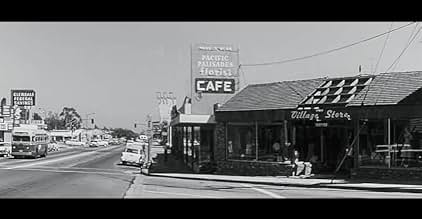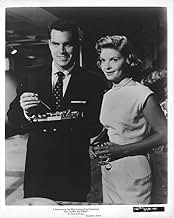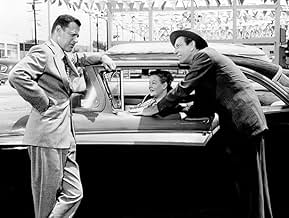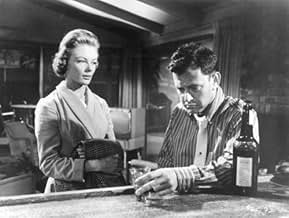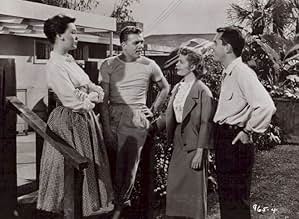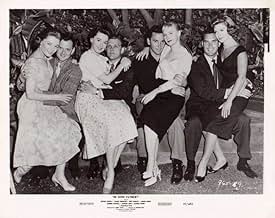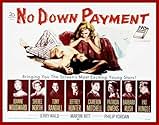CALIFICACIÓN DE IMDb
7.1/10
1.3 k
TU CALIFICACIÓN
En California, cuatro parejas han comprado casas cerca la una de la otra se enfrentan a problemas, alcoholismo, racismo, promiscuidad y discriminación por falta de educación, hasta que un tr... Leer todoEn California, cuatro parejas han comprado casas cerca la una de la otra se enfrentan a problemas, alcoholismo, racismo, promiscuidad y discriminación por falta de educación, hasta que un trágico suceso les obliga a replantearse sus vidas.En California, cuatro parejas han comprado casas cerca la una de la otra se enfrentan a problemas, alcoholismo, racismo, promiscuidad y discriminación por falta de educación, hasta que un trágico suceso les obliga a replantearse sus vidas.
- Dirección
- Guionistas
- Elenco
- Nominada a2premios BAFTA
- 1 premio ganado y 2 nominaciones en total
Robert H. Harris
- Markham
- (as Robert Harris)
Robert Burton
- Mr. Cagle
- (sin créditos)
Mary Carroll
- Mrs. Burnett
- (sin créditos)
George Chester
- Car Attendant
- (sin créditos)
Heinie Conklin
- Church Member
- (sin créditos)
Frank Gerstle
- Verdun
- (sin créditos)
Mimi Gibson
- Sandra Kreitzer
- (sin créditos)
Charles Herbert
- Michael Flagg
- (sin créditos)
- Dirección
- Guionistas
- Todo el elenco y el equipo
- Producción, taquilla y más en IMDbPro
Opiniones destacadas
The script is sharp and at times, poignant, the acting is superb, and the overall impact is overwhelming. It peels the label off of the seemingly happy suburban couples and, in so doing, provides the sharpest snapshot ever put to film about a time and place that no longer exists, the one that was written about by such giants as Updike and Cheever. The only problem with this movie is that it's only shown on TV about once every ten years and it's not available on video. One last comment. After watching this movie, you'll never look at Tony Randall in the same way.
This 20th Century Fox expose of "the good life" in the suburbs wasn't seen by anybody much in 1957, and it's easy to see why: It probes convincingly deep into the less pleasant aspects of this clean, all-white subculture, and suburban moviegoers probably didn't want to see their worst aspects on screen, and urban audiences didn't care. Early Martin Ritt, and typically thorough of him, it explores prejudice, sexism, alcoholism, war veterans with what would now be diagnosed as PTSD, and capitalism's way of trapping young families in debt. The wide-screen black-and-white cinematography is clean and alluring, and all eight principals do well--Sheree North, groomed by 20th to be a threat to Monroe, proves once again that they didn't really give her enough chances to show what she could do. The shiny surfaces and flattering clothes and powerful cars all illustrate that "good life," and show what's wrong with it. And in comprehensively exploring the roots and hypocrisies and effects of racism at the time, it's a good deal braver than many contemporary films.
It may not be Peyton Place but this tight-knit Californian community is still plagued by maritial infidelity, heavy drinking, domestic abuse, rape and, of course, racial prejudice. Martin Ritt's "No Down Payment" benefits from being well-written, (Philip Yordan), nicely photographed in black-and-white Cinemascope, (Joseph LaShelle), and it features a good cast of up-and-coming Fox stars headed by Joanne Woodward, (very good), though it's Tony Randall and Pat Hingle who walk off with the picture. Considered very daring and adult in its day, it now seems pretty tame but it did pave the way for a number of 'grown-up' American movies in the late fifties and early sixties and is actually a very good example of its kind. Worth rediscovering.
The performances of Pat Hingle and Barbara Rush seem very modern to me. When he washes the car while the rest of the community goes to church, she gently admonishes him for not going to church, but conveys to the audience that this has long been a point of contention between them, and that she understands his reasons - just as he understands her desire to have him attend church. However, like any intelligent wife, she doesn't go over old ground; she simply suggests a compromise. She negotiates with him quickly and easily by suggesting that he wash the car after church from now on. He easily agrees, and the matter is settled. In at least three other scenes,they're shown disagreeing about various issues - however, they do it calmly and maturely, and with a healthy dose of humor.
One scene explains, with charm, that they are simpatico in the bedroom, too. She doesn't make him bust his chops wooing her, and she doesn't pretend that she isn't interested, like good little 1950's girls were supposed to do,
Most moving is a scene in which they have their worst disagreement, and both actors effectively evoke their unhappiness about not being on the same page. One senses that this couple is very close, and that they derive strength from their partnership. After this worst disagreement, they attend a party at which Pat Hingle approaches his wife in a tender way, and asks her to dance. She agrees immediately, and in the following scenes, we see them dancing happily, and exchanging reassuring looks.
I think this couple's marriage depicts a healthy relationship. They're always ready to calmly discuss things, to hear each other out, and be fair. Their goal in any discussion seems to be reaching a fair agreement, and getting back to being good friends, as well as lovers.
In my opinion, Pat Hingle helms this movie. The other characters seem dated. For example, Hingle is the only one who jumps up to call the police after a crime has been committed; Hingle is the only one who is sensibly, not insanely, ambitious; Hingle is the only one who doesn't seem interested in other women; Hingle is the only one who considers his wife a partner, and values her opinion; Hingle is the one who is physically affectionate with his children; and most importantly, Hingle is the one who raises questions about racism and intellectual bigotry. And thanks to the script, he isn't a crusader. He is a man who is open-minded enough to contemplate these issues as they are presented to him, and to question the passive bigotry that he comes to realize has been ingrained in him by his family and country.
Hingle and Rush's characters ring true, and are beautifully portrayed by the actors. The other characters are broadly-drawn, one dimensional, and have not aged well.
One scene explains, with charm, that they are simpatico in the bedroom, too. She doesn't make him bust his chops wooing her, and she doesn't pretend that she isn't interested, like good little 1950's girls were supposed to do,
Most moving is a scene in which they have their worst disagreement, and both actors effectively evoke their unhappiness about not being on the same page. One senses that this couple is very close, and that they derive strength from their partnership. After this worst disagreement, they attend a party at which Pat Hingle approaches his wife in a tender way, and asks her to dance. She agrees immediately, and in the following scenes, we see them dancing happily, and exchanging reassuring looks.
I think this couple's marriage depicts a healthy relationship. They're always ready to calmly discuss things, to hear each other out, and be fair. Their goal in any discussion seems to be reaching a fair agreement, and getting back to being good friends, as well as lovers.
In my opinion, Pat Hingle helms this movie. The other characters seem dated. For example, Hingle is the only one who jumps up to call the police after a crime has been committed; Hingle is the only one who is sensibly, not insanely, ambitious; Hingle is the only one who doesn't seem interested in other women; Hingle is the only one who considers his wife a partner, and values her opinion; Hingle is the one who is physically affectionate with his children; and most importantly, Hingle is the one who raises questions about racism and intellectual bigotry. And thanks to the script, he isn't a crusader. He is a man who is open-minded enough to contemplate these issues as they are presented to him, and to question the passive bigotry that he comes to realize has been ingrained in him by his family and country.
Hingle and Rush's characters ring true, and are beautifully portrayed by the actors. The other characters are broadly-drawn, one dimensional, and have not aged well.
I'm so glad I bought this movie. The acting is superb, and as someone before said, it's definately Oscar-worthy. Although Joanne Woodward won an Oscar for another movie ('The Three Faces Of Eve') the same year, she should have been nominated for this one as well. This movie is SO well-acted I can't even believe it. I expected a riveting, stand-out performance from Joanne Woodward, because you can always count on her for that. But I didn't expect the rest of the cast to give wonderful performances as well. The one thing that got me is I never knew which characters to like. They all had their good points and their bad.
If for nothing else, see the movie for Joanne Woodward. If you're ever feeling doubtful about the acting ability of some of today's actors, go watch a Joanne Woodward movie. She'll renew you. I'm so amazed by that girl's talent.
If for nothing else, see the movie for Joanne Woodward. If you're ever feeling doubtful about the acting ability of some of today's actors, go watch a Joanne Woodward movie. She'll renew you. I'm so amazed by that girl's talent.
¿Sabías que…?
- TriviaOf Joanne Woodward's films, this is her personal favorite.
- Citas
Jerry Flagg: I couldn't come home. I was feeling so punk.
- ConexionesFeatured in Pasión a 24 cuadros por segundo (2003)
- Bandas sonorasThe Drive-In Rock
(uncredited)
Music by Lionel Newman
Lyrics by Carroll Coates
[The song first played and danced to at the Flaggs' dinner party, then played later when Troy rushes home after finding out about the Police Chief job]
Selecciones populares
Inicia sesión para calificar y agrega a la lista de videos para obtener recomendaciones personalizadas
- How long is No Down Payment?Con tecnología de Alexa
Detalles
- Fecha de lanzamiento
- País de origen
- Idioma
- También se conoce como
- Fenster ohne Vorhang
- Locaciones de filmación
- 15281 W. Sunset Blvd., Pacific Palisades, Los Ángeles, California, Estados Unidos(Troy Boone's Mobil gas station)
- Productoras
- Ver más créditos de la compañía en IMDbPro
Taquilla
- Presupuesto
- USD 995,000 (estimado)
- Tiempo de ejecución1 hora 45 minutos
- Color
- Relación de aspecto
- 2.35 : 1
Contribuir a esta página
Sugiere una edición o agrega el contenido que falta

Principales brechas de datos
By what name was No Down Payment (1957) officially released in India in English?
Responda
